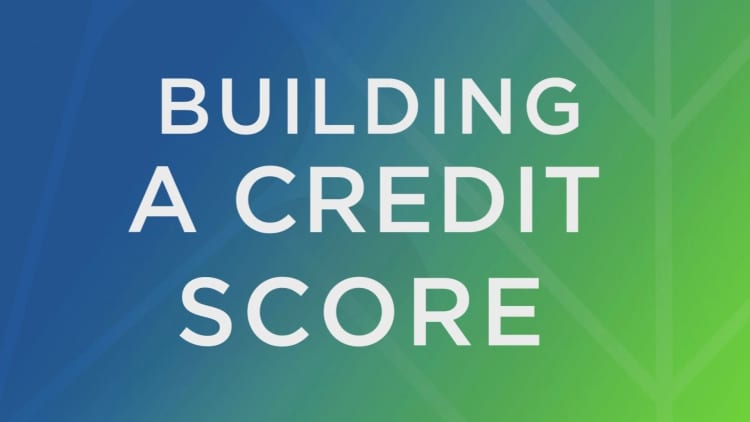Your FICO credit score may soon be changing, but if you see a dip in the next year, it's probably not because of an existing mortgage or a high student loan balance. It's more likely based on your payment habits.
Fair Isaac Corp., the company behind the popular FICO credit score said Thursday that its newest scoring models rolling out this summer will consider consumers' payment history and the level of debt they're taking on.
But those with high mortgages and student loan balances shouldn't freak out. FICO's new scoring model is more focused on checking to see if your debt level, especially credit card balances, has been significantly on the rise and whether you've been making regular and timely payments on any debt you have accumulated.
"We do look at overall balances, but we look at it in the context of everything else that's going on that account," Dave Shellenberger, FICO vice president of product management, tells CNBC Make It. And that includes what your credit card balances look like and how aggressively you're seeking new credit.
Because of the changes, FICO estimates that about 110 million consumers will see small changes of less than 20 points to their scores under the new credit score model.
Here's a look at the factors that will really impact where you may rank in the new scoring model.
What is included in credit scores?
Credit scores, including FICO's, are based on consumer data collected by the three major credit bureaus: Equifax, Experian and TransUnion. Scores range from about 300 to 850, with a good credit falling between 670 and 739 range, and anything below 580 being described as "bad credit."
The score takes into account payment history, number of accounts open, the length of your credit history and the amount you currently owe. Your age, race, salary, employment history and where you live is not factored in.
The credit bureaus stopped adding many of the so-called "negative credit indicators," such as tax liens and judgments from credit reports in recent years. And because of a 2015 settlement with state attorneys general, Equifax, Experian and TransUnion have to wait 180 days before adding any kind of medical debt to your report.
Source: myFICO
How does existing debt play out with this new scoring model?
About 30% of your FICO credit score is based on the total amount you currently owe — and that's not changing under the new model, Shellenberger says.
But let's break down what that means. To calculate your score, companies like FICO look at both installment credit — which includes student loans, mortgages, auto loans — and revolving credit, the most common types being credit cards and home equity lines of credit (HELOCs).
Don't panic if you have a lot of student loans and/or a mortgage. Installment debt is "almost benign" to your credit scores, John Ulzheimer, an expert on credit scores and credit scoring, tells CNBC Make It. "You can have hundreds of thousands of dollars of installment debt and still have elite credit scores," he says. "It's the revolving debt that's problematic."
It's a point Shellenberger reiterates: "Having outstanding student loan debt, in and of itself, is not going to significantly damage or negatively affect your score," he says.
Having outstanding student loan debt, in and of itself, is not going to significantly damage or negatively affect your score.Dave ShellenbergerFICO vice president of product management
If you have large loans, such as student debt, it's crucial that you "continue to pay," Shellenberger says. "Repayment performance is one of the key drivers of the FICO score." Payment history makes up about 35% of FICO scores and will continue to do so going forward, he says.
In fact, consumers who have been good at managing their credit, regularly paying bills on time, and keeping their balances in check are likely going to be "rewarded" by seeing a gain in their score under the new model, Shellenberger says.

What types of financial behavior can be detrimental?
As part of the new credit scoring update, FICO is releasing the 10T score, which will use "trended data." This is an industry term that basically means the new score will look at your credit behavior over the past two years, as opposed to just a snapshot.
This can be really helpful for those who are practicing good credit habits, but it can also penalize more harshly those who are racking up debt and struggling to pay it off. Someone may see their score dip, for example, if they take out a personal loan to consolidate their credit card debt, but then continue to build up those credit card balances again.
"The data shows that [kind of behavior] correlates very highly with future delinquency and default," Shellenberger says. "And then that is reflected by the credit score at the end of the day."
Credit utilization is also something that the new FICO credit score will continue to closely monitor. This refers to the ratio of money you have on your credit cards to the total amount of credit you have available. If you have a credit card with a $20,000 limit and you're carrying a $10,000 balance month-to-month, your utilization rate is about 50% — which is not great. Experts typically recommend that you keep the utilization as low as possible, with the data showing that consumers who have a credit score of 795 or above typically use an average 7% of their credit limit.
At the end of the day, that's not a "consumer unfriendly." Ulzheimer says. "Consumers who are of elevated credit risk should not have better scores than consumers who have less risk. That's credit scoring 101," he says, adding that you may have to work to earn a better score.
But that doesn't mean it's impossible. In fact, FICO actually estimates that about 40 million will see their scores increase by 20 points or more. And that's because maintaining those good credit habits "are rewarded quite strongly with FICO score 10 and 10T," Shellenberger says.
All the more reason to pay off your credit cards whenever possible and make on-time payments. And if you haven't been as diligent, you do have some time. Shellenberger expects most lenders adopt the new model next year.
Don't miss: 110 million consumers could see their credit scores change under new FICO scoring
Like this story? Subscribe to CNBC Make It on YouTube!



